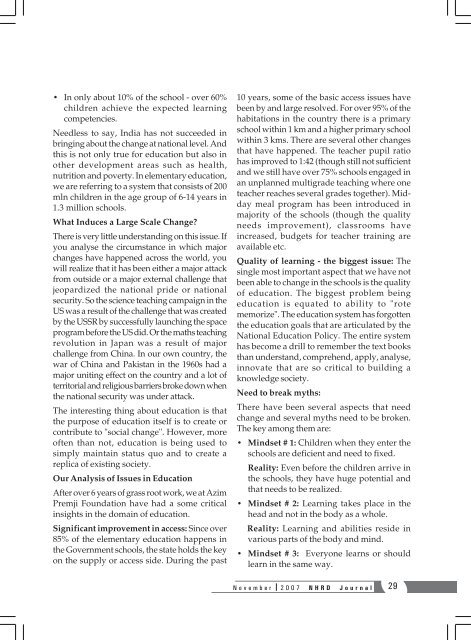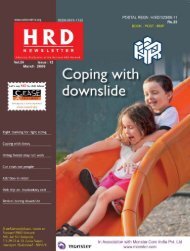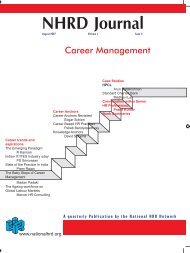NHRD Journal - National HRD Network
NHRD Journal - National HRD Network
NHRD Journal - National HRD Network
You also want an ePaper? Increase the reach of your titles
YUMPU automatically turns print PDFs into web optimized ePapers that Google loves.
• In only about 10% of the school - over 60%<br />
children achieve the expected learning<br />
competencies.<br />
Needless to say, India has not succeeded in<br />
bringing about the change at national level. And<br />
this is not only true for education but also in<br />
other development areas such as health,<br />
nutrition and poverty. In elementary education,<br />
we are referring to a system that consists of 200<br />
mln children in the age group of 6-14 years in<br />
1.3 million schools.<br />
What Induces a Large Scale Change?<br />
There is very little understanding on this issue. If<br />
you analyse the circumstance in which major<br />
changes have happened across the world, you<br />
will realize that it has been either a major attack<br />
from outside or a major external challenge that<br />
jeopardized the national pride or national<br />
security. So the science teaching campaign in the<br />
US was a result of the challenge that was created<br />
by the USSR by successfully launching the space<br />
program before the US did. Or the maths teaching<br />
revolution in Japan was a result of major<br />
challenge from China. In our own country, the<br />
war of China and Pakistan in the 1960s had a<br />
major uniting effect on the country and a lot of<br />
territorial and religious barriers broke down when<br />
the national security was under attack.<br />
The interesting thing about education is that<br />
the purpose of education itself is to create or<br />
contribute to "social change". However, more<br />
often than not, education is being used to<br />
simply maintain status quo and to create a<br />
replica of existing society.<br />
Our Analysis of Issues in Education<br />
After over 6 years of grass root work, we at Azim<br />
Premji Foundation have had a some critical<br />
insights in the domain of education.<br />
Significant improvement in access: Since over<br />
85% of the elementary education happens in<br />
the Government schools, the state holds the key<br />
on the supply or access side. During the past<br />
10 years, some of the basic access issues have<br />
been by and large resolved. For over 95% of the<br />
habitations in the country there is a primary<br />
school within 1 km and a higher primary school<br />
within 3 kms. There are several other changes<br />
that have happened. The teacher pupil ratio<br />
has improved to 1:42 (though still not sufficient<br />
and we still have over 75% schools engaged in<br />
an unplanned multigrade teaching where one<br />
teacher reaches several grades together). Midday<br />
meal program has been introduced in<br />
majority of the schools (though the quality<br />
needs improvement), classrooms have<br />
increased, budgets for teacher training are<br />
available etc.<br />
Quality of learning - the biggest issue: The<br />
single most important aspect that we have not<br />
been able to change in the schools is the quality<br />
of education. The biggest problem being<br />
education is equated to ability to "rote<br />
memorize". The education system has forgotten<br />
the education goals that are articulated by the<br />
<strong>National</strong> Education Policy. The entire system<br />
has become a drill to remember the text books<br />
than understand, comprehend, apply, analyse,<br />
innovate that are so critical to building a<br />
knowledge society.<br />
Need to break myths:<br />
There have been several aspects that need<br />
change and several myths need to be broken.<br />
The key among them are:<br />
• Mindset # 1: Children when they enter the<br />
schools are deficient and need to fixed.<br />
Reality: Even before the children arrive in<br />
the schools, they have huge potential and<br />
that needs to be realized.<br />
• Mindset # 2: Learning takes place in the<br />
head and not in the body as a whole.<br />
Reality: Learning and abilities reside in<br />
various parts of the body and mind.<br />
• Mindset # 3: Everyone learns or should<br />
learn in the same way.<br />
November 2007 <strong>N<strong>HRD</strong></strong> <strong>Journal</strong> 29
















